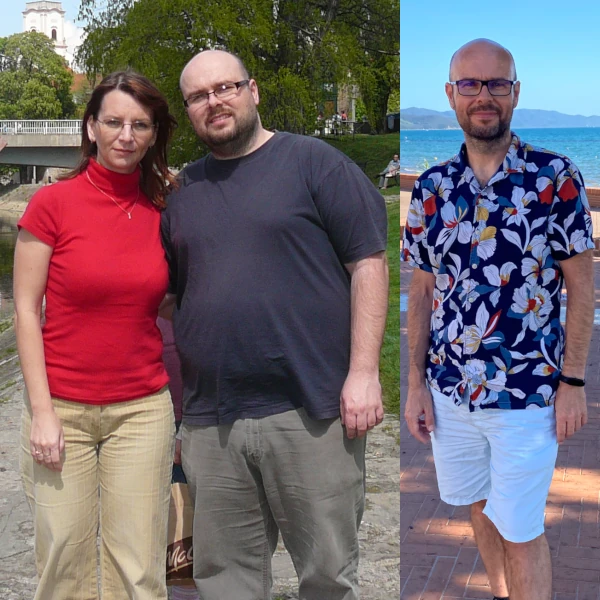My Weight Loss Story

My highest weight ever was 127 kg, sometime in the mid-2000s. The picture on the left was taken in 2009; I’m the guy in the blue t-shirt. The photo on the right is of me in the summer of 2023.
Of course, I tried a lot of things, but my weight yo-yoed up and down until in 2018, I got to the point where it became relevant to take a blood pressure medication regularly. This was not something I wanted at all, at 43 years old, to embark on a lifelong medication journey. On January 1, 2019, I made a New Year’s resolution to change my lifestyle, weighing 118 kg.
The first year was about finding my way. I embarked on learning a relaxation technique, autogenic training, to combat stress - my first success. Unfortunately, I didn’t lose more than 6 kg that year. I really wanted to, but it didn’t work.
The subsequent success came when I tried IF (intermittent fasting); I got breakfast out of my life and felt better, and finally managed to lose weight.
Then COVID hit, and I was absolutely terrified. I saw everywhere that fat people were at much greater risk than their normal-weight counterparts. And then I finally got on the treadmill that had been gathering dust for so long and started walking. I didn’t want to go outside, so I walked inside. At first, I walked a little, then I increased my daily walking to over 40 minutes. Then I started to monitor my heart rate, and by adjusting the incline and speed on the treadmill, I got my heart rate to stay between 114 and 131.
This was my traditional fat-burning range at the time. I didn’t know the science behind it at the time, let alone that this heart rate range was the subject of much debate, with many calculation methods to choose from on the internet. The calculation I used at the time was age-dependent. It starts from the definition of the maximum heart rate, which is 220 - age. 65-75% of this number is the fat-burning range. At 45 years old, that meant for me a heart rate of exactly 113.75 to 131.25. And it worked.
Then, of course, everything stopped a bit after a while, so that’s when I started experimenting. Bread was out of my life a long time ago, but when I found out that my wife Eszter was gluten intolerant, that gave me another boost, and I got rid of pasta. I started measuring my calorie intake and using various calculators to determine my calorie intake and how much I could lose weight. I did a lot of experimenting and ended up with around 1400 calories. And by then I had already skipped dinner. I ate these 1400 calories all at once, at lunchtime. My primary food source is, unfortunately, animal protein…
And let’s stop here because there came a moment in my weight loss when I looked at myself in the mirror and didn’t recognise myself. I stood and looked at my new face, my new body, and although it felt good to lose weight, I couldn’t help but feel wrong about my new look. There’s no shame in asking for help; I went to a psychologist to help me process the changes.
I also started paying attention to my sleep; I deliberately set aside 8 hours for rest and switched from 6 hours to 8 hours of bedtime. Sure, it’s easy to say, and even now, it’s not 100%, but even if I wake up at night, I don’t open my eyes and start looking at the clock. My watch will buzz on my wrist when I can get up anyway. Until then, I have to lie with my eyes closed. I’ve also started using earplugs; my smartwatch says it adds 8-10 points to my sleep at night.
For me, exercise is not just walking or running or cycling. I’m actively doing spinal exercises, or instead, yoga, because the traditional spinal exercises have been replaced by yoga exercises, which I do every day after my daily workout.
I probably have a carbohydrate intolerance, but I don’t have the energy to check it out. I am constantly trying to reintroduce carbohydrates into my diet. My most recent attempt was in October 2023, the month I was preparing to run a half marathon and ran over 200 km. Carbohydrates are supposed to be essential for long-distance runners, so I switched half of my protein to carbohydrates while running - the result was an extra 5kg in 2 weeks. As I documented everything daily, it was easy enough to see, so I stopped carbs in the middle of the month to get my weight back by the end of October. Once again, all this while running 200 km that month.
Then, in November 2023, I tried a completely dairy-free diet - milk, cheese, butter, yoghurt, and protein powders - all of which I put on the no-food list and a recurring muscle ache disappeared. And since I haven’t eaten dairy since, the muscle pain hasn’t returned. Who would have thought it would make such a difference?
The series includes:
- My Weight Loss Story
- Maintaining My Weight
- Let's Begin!